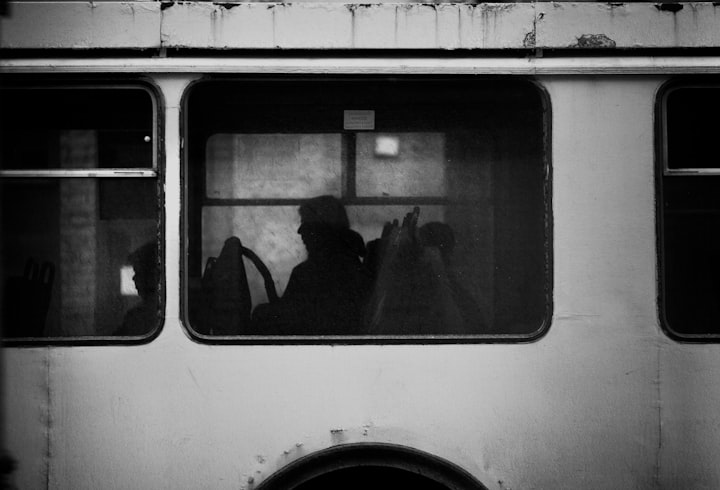The Bus Stop
The year is 1970, there is a boy, a mother and a glass bottle of milk.

‘Love set you going like a fat gold watch.
The midwife slapped your foot soles, and your bald cry
Took its place among the elements.’
The glass walls of the bus shelter had begun to grow frosty flowers against the crisp, cold morning air. There was no fresh morning bliss on that day, just a dry chill that froze the rubbish onto the road. The street smelt foul, a rotting bouquet of flowers, a body. Somewhere far in the distance the sounds of a bustling city slithered its way through the backstreets…almost reaching her ears. The chilly breeze blew brown leaves across the pavement, she pulled her scarf tighter around her neck, too tight, a tug away from causing pain, and with shaking fingers turned the page in her paper-back book. She looked up and down the road, there was no sign of the seven-o-clock bus, and no sign of life on the street that early on a Sunday. Except for a young boy sitting on the steps of a grey terrace house across the road, drinking milk out of its carton, wiping his mouth on his sleeve as he too peered over the quiet, deep, dead, street. She imagined that the milk would be sour. She peered through the gap in the dark green curtains of the terrance house, and saw a television screen flashing with static fuzz…no picture, no early morning news…empty nothing. She read on…
‘Our voices echo, magnifying your arrival. New statue.
In a drafty museum, your nakedness
Shadows our safety. We stand round blankly as walls.’
The young boy across the street was rolling the now empty milk bottle up and down the step he was perched on, his little fingers turning an almost blue in the morning chill. The television screen that stared at her through the dark green curtains flashed, black and white, black and white. Its owner tapped its surface, like a nurse bringing a baby breath. The news began flashing on the screen. Walter Cronkite. Rice fields. A quagmire bog. Muddy faced boys, scared, craving home, a touch, a shot. The new days death count already rolling…4…5…6…7…8…She wondered which mothers would receive a yellow telegram today. A lottery was drawn. Tears, a sobbing cry, caught in the back of her through. She would not let them free. Bless the boys that were born on the 5th day of the 7th month. She looked down the street, no bus, she flipped the page…
‘The sap
Wells like tears, like the
Water striving
To re-establish its mirror
Over the rock’
The boy held the milk bottle up to his eye, transforming it into a telescope, and he an explorer. His small body created a shadow in the light from the grey morning sun. He looked as though he was playing with a friend, and was not so alone.
The street had slowly started to move, in a slow opiate sleepwalk, in time with the glass drumming on stone, doors opened, feet stepped, high heels down stairs, the bus stop was filling, one by one, with trench coats and blazers worn by faceless people, hidden behind newspapers and crossword puzzles. She was bewitched by the way that their eyes moved across the pages of the papers that they held in their hands, all with such conviction…as though they were grasping at their own, personal universes. They moved in unison, an off-putting togetherness, one eye after another, almost tapping into the beautiful, untouchable homogeny that tries to hold the world together with sellotape, nails and glue…surreal…or unreal. If one of them had the capacity to look up, for just a second, they would have seen her staring, and maybe noticed that she was wearing black, or that she was still waiting for the perfect moment to let her grief lift up and take its place in the sky. Still no bus. She continued to read…
‘Words dry and riderless,
The indefatigable, hoof taps,
While
From the bottom of the pool, fixed stars
Govern a life.’
The gentle humming bird buzz of a distant bus engine. She snapped her book shut. The bus stop was almost full now, the men in trench coats, women in lace trimmed blazers, a woman in a deep, blood red coat, a young man in a blue jumper…like the one he used to wear. The fingers of the young boy across the road had become slippery with dew, the milk bottle slipped from his clutches, smashing on the pavement.
And in the same way that Lady Lazarus rose from the depths of her grave, she let herself, in the golden age fashion of grief, free a tear....she freed her grief from the cage in her chest.
She felt it rise, a handful of balloons escaping from the fist of a child and fill her chest to the point that it could burst. The boy stood in a field of broken glass. The bus approached from the end of the street, she joined the line and marched to purchase her ticket. She sat near an open window, and continued to weep. The driver ignited the engine, and they left the bus stop and the boy with his shattered glass behind. She looked out of the window, onto the moving street, feet dragging across the pavement, doors closing, curtains being drawn, televisions screaming static…
…humankind drifting in the wind like dust.
REFERENCE LIST
Sylvia, Plath. Ariel. London: Faber & Faber, 1965.
About the Creator
Alyssia Balbi
Hey, I am Australian and I am around 22 years old...I love to write, on my deck, with a cup of tea...this is just my being really, I am sure you will not judge. Thank you for coming here.






Comments
There are no comments for this story
Be the first to respond and start the conversation.